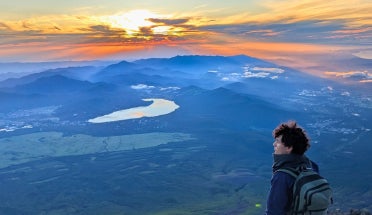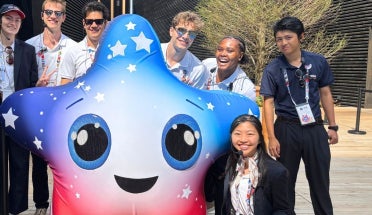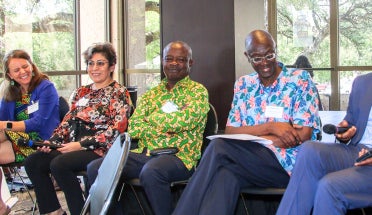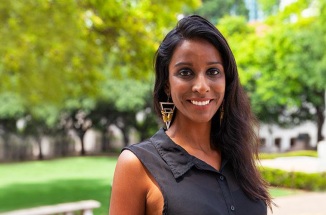
Meet the Journalist With Big Plans for Democracy in South Africa
- Sep 13, 2018
South African journalist Verashni Pillay believes in the power of information and is dedicated to making sure all people have access to it.
Pillay was only ten years old when South Africa experienced its transition from apartheid to democracy in 1994. Witnessing these events led her to realize her calling to be a journalist because she believes the press is essential in holding governments accountable.
Currently working for Power 98.7, a private radio station, Pillay is exploring ways to develop a new business model for news organizations, which she believes is essential in today’s ever-changing high-tech world. She is also aiming to integrate technology in news and improve the accessibility of information for as many people as possible.
That’s what brought Pillay to Austin. She was one of a select group chosen to take part in the Mandela Washington Fellowship for Young African Leaders and attended the Business and Entrepreneurship Institute run by Texas Global at UT Austin.
Every year, we are excited to meet our Mandela Washington Fellows. They are all exceptional leaders and outstanding people, innovators and visionaries. Pillay came with a dream to form her own media startup and was amazed by how much she learned about entrepreneurship from her professors and classmates. She told us about herself, experiences as a journalist – including being editor-in-chief of two South African publications – and important takeaways she will bring back to South Africa after being in Austin for the Mandela Washington Fellowship.
Verashni, tell us about yourself.
I was born in the capital of South Africa, it is called Pretoria. Most people don’t know it’s the capital. It’s an administrative city. Now I live in Johannesburg which is not too far away from Pretoria and it is the biggest city in South Africa.
I come from a big family. We are South African. Our family heritage is that we are of South Indian descent, but it’s so long ago that we consider ourselves South African.
But what is interesting about South Africa, and what I also consider interesting about me, is that I consider myself black. During apartheid, part of the divide and conquer strategy was that you could get categorized in different racial groups: Indians with Indians, blacks with blacks. As part of trying to fight against that, some of my family, who were not black, chose to identify as black. Until this day, I am legally considered black in my country in terms of affirmative action.
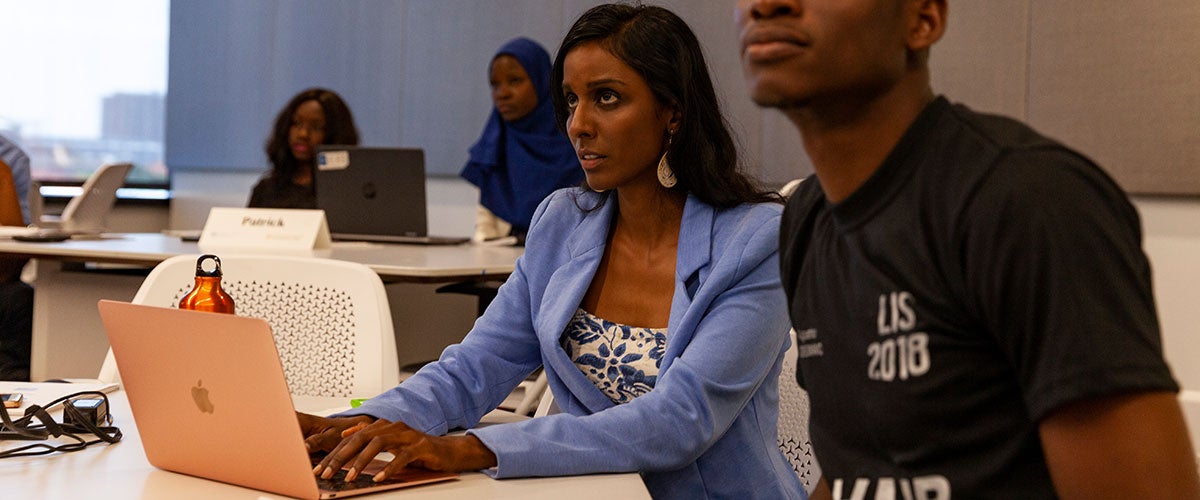
What do you do in South Africa? What inspired you to launch a career in this field?
I am a journalist. For me, it’s more of a calling and a passion than a career. I have had great career success. I was editor-in-chief of two major publications at a very young age. I have won awards. But for me, the reason that I do it is that I really do believe in democracy. I really do believe that journalism work is a crucial mechanism, one of the mechanisms of accountability that keeps democracy healthy. And that is why I love what I do.
I don’t do hardcore investigative journalism. I’m more interested in finding models and ways of creating journalism that gets the important information to citizens, so they can hold the governments accountable. And that might mean business models because journalism is in trouble in terms of reaching more people because of trust and audience, and younger audiences and fake news –– so it’s a lot of things.
But mostly I’m interested in getting journalism to do its job which is to reach as many people as possible, with information to make democracy work.
I have been inspired by my country’s history, its transition from apartheid to democracy. I was ten years old when it happened and I experienced it very vividly. I read the constitution very closely and I was so upset that I could not vote on our first voting day. That went on to inspire a deep passion for justice and for holding all governments to account. I would not want to see that repeat to a large scale.
I’m currently working at Power 98.7, a radio station. And it’s a private network and a black-owned company which is very rare in the South African media stage. Power 98.7 created a road for me in many ways because they kind of set digital as the way to go to know the audience. I have been there for about a year and I’m working on what I wanted for I long time in my career which is to build a digital team.
But what I am really interested in is finding ways to reach even more people. Because I feel that at least in South Africa, and in Africa and the across World, it tends to be very elitist and we keep reaching the same people again and again.
And that is why I love Power 98.7. We have listeners who are not your typical middle-class listeners. We have listeners call from what we call townships –– and townships are typically poor areas; so they have access and they would call our radio station. They have the most informed confident opinions, and I think that is where change happens in a society: when you are reaching everyone.
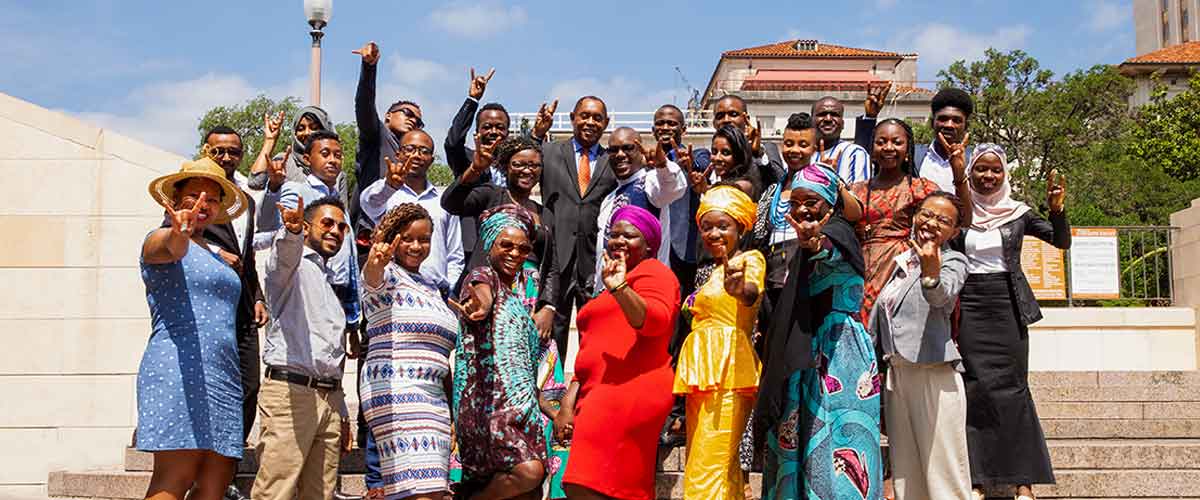
How did you learn about the Young African Leaders Initiative Program (YALI)?
YALI is very well known in my country. It’s earned a reputation. You always hear about people who have done it, about how amazing it was. The U.S. embassies are very active in our countries and they are very good about bringing Africans together to have conversations about Africa, which is sad that we don’t do that ourselves.
When I was a young journalist the embassies kept reaching out to me, inviting me to events. They started telling me about this program and told me to perhaps apply. It was for ages 24 to 35. Because I was doing very well as a journalist, people knew me and would tell me, “Verashni, you should apply.” I was like, “No, I have plenty of time. I’m still 25, 26, 27.” I would say, “I’ll do it later because I would have to take two months off.” And I joke with the fact that I woke up one day and was like “I’m 34, I have to apply now.”
So I applied for a bunch of different fellowships including this one. And I felt it was so right that I got this one. I can’t tell you how perfect, how amazing, it has been. It has been perfect. The quality of teaching that we are getting and how professors are challenging us.
What skills have you acquired or refined during the program?
It’s huge. You don’t understand how many notes I have taken. I just go home and I think about how my mind has been blown. Every day I just absorb. I needed someone to shake me and tell me this is how the world works.
Professor John Doggett is the academic kind of professor of our program. When I first met him I did not like him because he was like, “Africans need to stop whining” and Africans hate to hear that. We are always like, “Don’t tell us that we need to stop whining; we experienced centuries of exploitation and colonialism. Don’t tell us!” And he was like, “Stop whining. Get over it. You are the last generation so stop whining. Stop thinking that you are doing such a great job.” And I was just like, “Who does this man think he is?” And then within a few days, I was like, “I am so lucky to have this man in my life.” He just changed the conversation for me personally, about not making any more excuses, not letting the past be an excuse for Africa failing and taking responsibility for the future.
There is also a woman called Charlee Garden. She is an LBJ professor and she is doing the softer skills with us, like the leadership stuff. When I first met Charlee, I was like I need to just go home and meditate on this for a week. She has been talking to us about how we need to stop being. So, we were the 1 percent who were chosen for this program. There were 70,000 who applied from across Africa. That’s a smaller ratio than Harvard, apparently. When you’ve got to this level as a young person, you’re very invested in your image. And she is all about going, “Stop that. You are too afraid to fail, you’re too afraid of what people think about you.” It’s all about your mindset as a leader, and it’s hugely challenging.
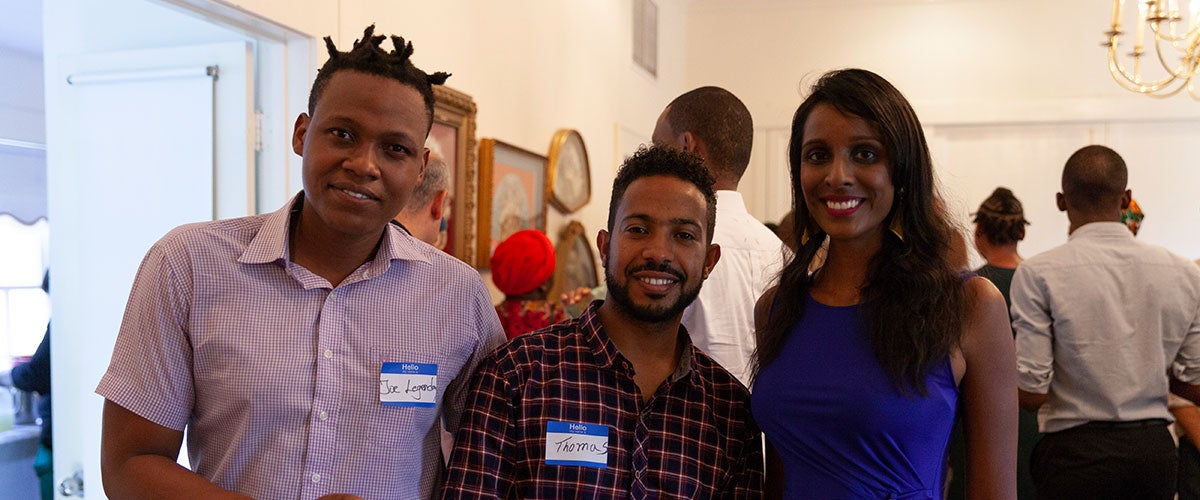
What have you learned from other fellows during your time in Austin?
There are only 25 of us and it took me a long time to get to know all of them. But within the first week, I had a sense who each person was. Professor Charlee Garden, she makes us do these intense exercises with each other like saying, “I give you permission to tell me something about myself that you think that I need to hear. Basically, give me negative feedback and constructive criticism.” We had to do something like that with each other, which makes you close to someone really quickly. We encouraged the other person or listen to them for seven minutes without interruption. And it has been the most powerful seven minutes of my life. My fellow classmate –– I will never see him the same way ever again. I will always have a special connection with him because of those seven minutes. Because of the time we have in the class and we all stay in the same block together, we tend to hang out together. We already feel like family in some way.
What ideas or concepts do you plan to implement in your country?
I was an exception. Most people who came here have a business already. I kind of got in and I had a business idea. But within week one, I thought I had to scratch this whole idea because they just blew my mind in terms of what to think about when you do business. So, what I'm bringing home is whatever I am able to come up within the next few weeks.
Where do you see yourself in the long term?
I definitely want to be in a space where I have created a business that enables the creation of quality journalism. I don't care about the platform. What I care about is the purpose. Journalism must do its job. It must reach people and it must make them informed. I don’t care about how that happens. I mean, I care about the ethics. But I think whatever the platform is—maybe print isn’t entirely dead, maybe it’s broadcast. But to me, digital isn’t just digital. What kind of digital? My first idea when I came here is using messaging to distribute news, because of the low trust in social media has been very disrupting in terms of fake news. So, how do we restore that trust with our audiences again? But most importantly, it’s the business model, so I want to figure out a way to fund good journalism.
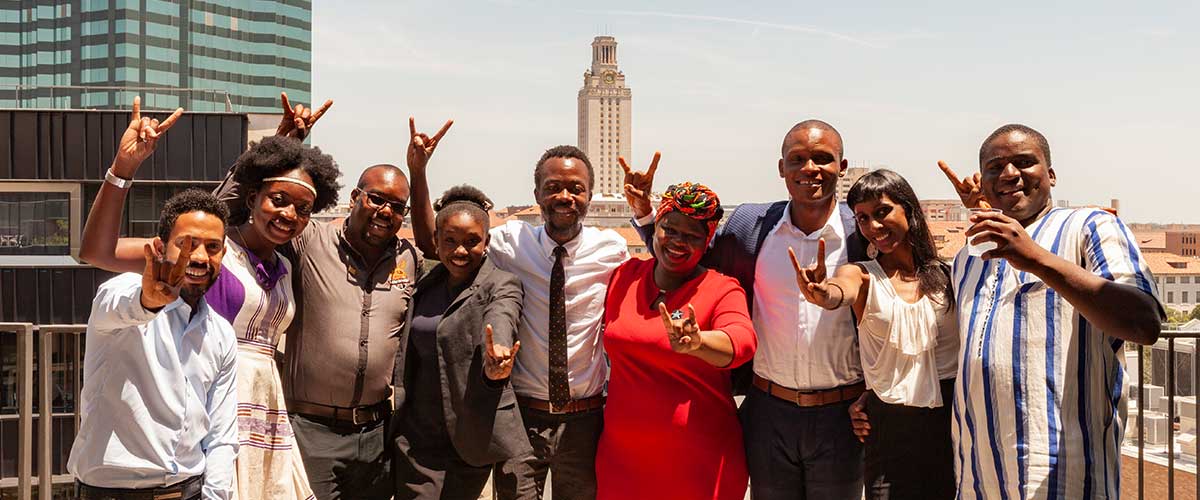
Why is it important for programs like these to exist?
One of the guest lecturers yesterday said to us that Austin has a population that’s way smaller than most African countries. But the City of Austin has an economy, a GDP, that dominates most African countries. Only Nigeria and South Africa are bigger than the city of Austin. Just being here, you’re in the –– there’s the 86 percent of the world and you’re in the 14 percent. You’re in the 14 percent mindset, the 14 percent headspace. He said take these lessons, go back and implement them in an 86 percent environment where we lift up people out of poverty.
What would you tell a young professional from Africa who is thinking of applying to the YALI program?
Definitely go for it. Only one percent gets chosen, so take it seriously. I kept seeing my friends and also people doing this program through the years and I thought, how much can you really do in six weeks? But you will not believe how much can be done. It is such a valuable thing to do. And I am so grateful for it.
This interview has been edited for clarity and condensed for brevity.
Learn more about the Mandela Washington Fellowship for Young African Leaders.

